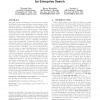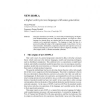409 search results - page 49 / 82 » Semantics for a theory of defeasible reasoning |
LREC
2008
13 years 9 months ago
2008
The objective of the Semiotic-based Ontology Evaluation Tool (S-OntoEval) is to evaluate and propose improvements to a given ontological model. The evaluation aims at assessing th...
AMAI
2006
Springer
13 years 7 months ago
2006
Springer
In this work, we introduce a new framework able to deal with a reasoning that is at the same time non monotonic and uncertain. In order to take into account a certainty level assoc...
SIGIR
2012
ACM
11 years 10 months ago
2012
ACM
Enterprise search is challenging for several reasons, notably the dynamic terminology and jargon that are specific to the enterprise domain. This challenge is partly addressed by...
TPHOL
2005
IEEE
14 years 1 months ago
2005
IEEE
The nominal approach to abstract syntax deals with the issues of bound names and α-equivalence by considering constructions and properties that are invariant with respect to permu...
IFIP
2004
Springer
14 years 29 days ago
2004
Springer
Abstract This paper introduces new-HOPLA, a concise but powerful language for higherorder nondeterministic processes with name generation. Its origins as a metalanguage for domain ...


